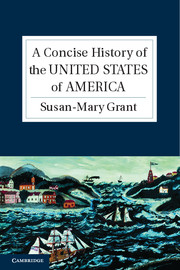Book contents
- Frontmatter
- Contents
- Figures
- Tables
- Acknowledgments
- Introduction
- 1 New Found Land
- 2 A City on a Hill
- 3 The Cause of All Mankind
- 4 Self-Evident Truths
- 5 The Last, Best Hope of Earth
- 6 Westward the Course of Empire
- 7 A Promised Land
- 8 The Soldier's Faith
- 9 Beyond the Last Frontier
- 10 A Land in Transition
- 11 Armies of the Night
- Notes
- Guide to Further Reading
- Biographies
- Index
4 - Self-Evident Truths
Founding the Revolutionary Republic
Published online by Cambridge University Press: 05 June 2012
- Frontmatter
- Contents
- Figures
- Tables
- Acknowledgments
- Introduction
- 1 New Found Land
- 2 A City on a Hill
- 3 The Cause of All Mankind
- 4 Self-Evident Truths
- 5 The Last, Best Hope of Earth
- 6 Westward the Course of Empire
- 7 A Promised Land
- 8 The Soldier's Faith
- 9 Beyond the Last Frontier
- 10 A Land in Transition
- 11 Armies of the Night
- Notes
- Guide to Further Reading
- Biographies
- Index
Summary
I do not mean to exclude altogether the idea of patriotism. I know it exists, and I know it has done much in the present contest. But I will venture to assert, that a great and lasting War can never be supported on this principle alone. It must be aided by a prospect of interest or some reward.
(George Washington to John Banister, April 21, 1778)“We hold these truths to be self-evident,” announced the Declaration of Independence of 1776, “that all men are created equal, that they are endowed by their Creator with certain unalienable rights, that among these are life, liberty, and the pursuit of happiness.” Inspiring words, yet they hardly reflected the reality of colonial America nor bore much relation to the nation's development once independence was achieved. Yet for America as a nation, this was a clear-cut case of, as the The Rubáiyát of Omar Khayyam has it, the moving finger “having writ/Moves on; nor all thy Piety nor wit/Shall lure it back to cancel half a Line,/Nor all thy Tears wash out a Word of it.” Such ambitious sentiments, once having been set down in plain manuscript, could not be taken back.
America's Founding Fathers believed, in drafting the Declaration, that they were simply defending their decision to separate from Great Britain. In fact, what they had produced was a vision statement, one that would commit their immediate progeny, and the many generations following them, to make real an ideal that these colonists may have believed in but most certainly never lived up to. At its inception, the American nation encapsulated the paradox of slaveholders preaching liberty, a fact that haunts the nation to this day. At the same time, from the moment of transition from colonies to nation, America developed under a self-imposed injunction to marry principle with practice. Like Banquo's ghost at the federal feast, the specter of those words, “all men are created equal,” and the accompanying assertion that this was a “self-evident truth” kept popping up at inconvenient moments to rattle the white republican cage.
- Type
- Chapter
- Information
- A Concise History of the United States of America , pp. 105 - 136Publisher: Cambridge University PressPrint publication year: 2012

